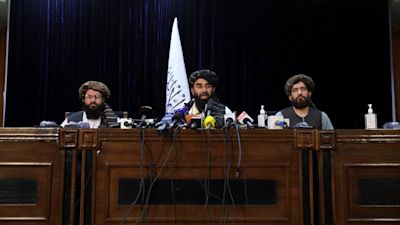Taliban claims to have 'emancipated' Afghanistan and thrown out foreigners in first national address

Members of congress are itching to hold an inquiry into what they say are mistakes by different presidents on Afghanistan, ITV News Security Editor Rohit Kachroo reports
The Taliban has finally "emancipated" Afghanistan and "expelled foreigners", the insurgents said in their first national address since taking control of the country.
Two days after Afghanistan fell back into the hands of the Taliban, spokesperson Zabihullah Mujahid described their rapid ascendecy to power as a "proud moment" for the embattled nation.
"After 20 years of struggle, we have emancipated [the country] and expelled foreigners," Mujahid, who has been a shadowy figure for years, said.
"This is a proud moment for the whole nation."
He also doubled down on the Taliban’s efforts to convince the world it has changed from the group that imposed a brutal rule on the country between 1996 and 2001.
He promised the Taliban would honour women’s rights, but within the norms of Islamic law. When asked about private media, Mujahid said the group wanted platforms to “remain independent,” but stressed journalists “should not work against national values.”
He also promised the insurgents would secure Afghanistan, but seek no revenge against those who worked with the former government or with foreign governments or forces. “We assure you that nobody will go to their doors to ask why they helped,” he said.
However, there have been reports of revenge killings and other brutal tactics in areas of the country the Taliban have seized in recent days, while others have reported the militants going door-to-door in search of people.
Following a blitz across Afghanistan that saw many cities fall to the insurgents without a fight, the Taliban has sought to portray itself as more moderate than it was 20 years ago.
CNN reporter Clarissa Ward spoke to one woman in Kabul in hiding from the Taliban
But many Afghans remain skeptical. Older generations remember the Taliban’s ultraconservative Islamic views, which included severe restrictions on women, as well as public stonings, amputations and executions, before they were ousted by the US-led invasion following the September 11, 2001 terror attacks.
CNN Correspondent Clarissa Ward, who is in Kabul, said people there were "desperately afraid" and, despite Taliban assurances, were trying all avenues to get out of the country.
She spoke to one woman who had worked for several international organisations, including US companies, who is so afraid for her life that she is hiding.
She said none of the organisations she had worked for had offered to help her escape.
ITV News Security Editor Rohit Kachroo dissects the Taliban's claim that it will not harbour terrorist groups like Al Qaeda
"I'm thinking of my future, of my daughters, what will happen to them if they kill me, two daughters without their mother," she said.
The capital of Kabul remained quiet for another day as the Taliban patrolled its streets and many residents stayed at home, remaining fearful after the insurgents’ takeover saw prisons emptied and armouries looted.
A broadcaster in Afghanistan said she was hiding at a relative’s house, too frightened to return home, much less return to work, following reports that the insurgents are also looking for journalists.
She said she and other women didn’t believe the Taliban had changed their ways. She spoke on condition of anonymity because she feared for her safety.
"[We] are committed to the rights of women under the system of sharia [Islamic law]," Mujahid said at the press conference. "They are going to be working shoulder to shoulder with us. We would like to assure the international community that there will be no discrimination."
The Taliban also told Sky News on Monday that under their rule, women will still be able to attend university. That would be a marked departure from the last time the Taliban were in power, when women were largely confined to their homes.
Rupert Colville, a spokesperson for the United Nations’ high commissioner for human rights, noted both the Taliban’s vows and the fears of everyday Afghans.
“Such promises will need to be honoured, and for the time being - again understandably, given past history - these declarations have been greeted with some skepticism,” he said in a statement.
“There have been many hard-won advances in human rights over the past two decades. The rights of all Afghans must be defended.”
When asked about the risk of Afghanistan becoming a haven for terrorist groups like Al Qaeda, Muhajid insisted: "Afghanistan's soil is not going to be used against anybody."
In response to this assurance, A US spokesperson told ITV News, "We are going to listen to these words. What we will be looking for are their actions."
The Taliban’s efforts to project a milder version of themselves may be aimed at ensuring that international aid money continues to flow - contributions from overseas are a crucial source of funding for Afghanistan.
Germany has halted development aid to Afghanistan over the Taliban takeover, but British Foreign Secretary Dominic Raab said humanitarian aid could rise by 10%.
Afghans run alongside and cling onto the side of a US military plane as it begins to take off from Kabul
He said the aid budget would be reconfigured for development and humanitarian purposes and that the Taliban would not get any money previously earmarked for security.
Meanwhile, Kabul’s international airport, the only way out for many, reopened to military evacuation flights under the watch of American troops.
All flights were suspended on Monday when thousands of people rushed the airport, desperate to leave the country.
In shocking scenes captured on video, some clung to a plane as it took off and then fell to their deaths. At least seven people died in chaos at the airport, US officials said.